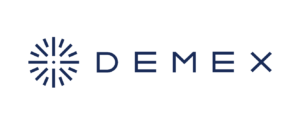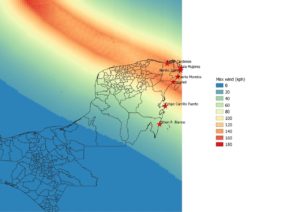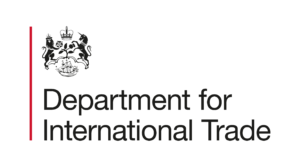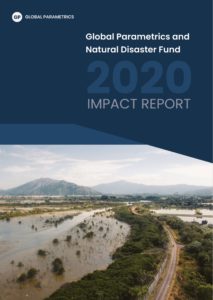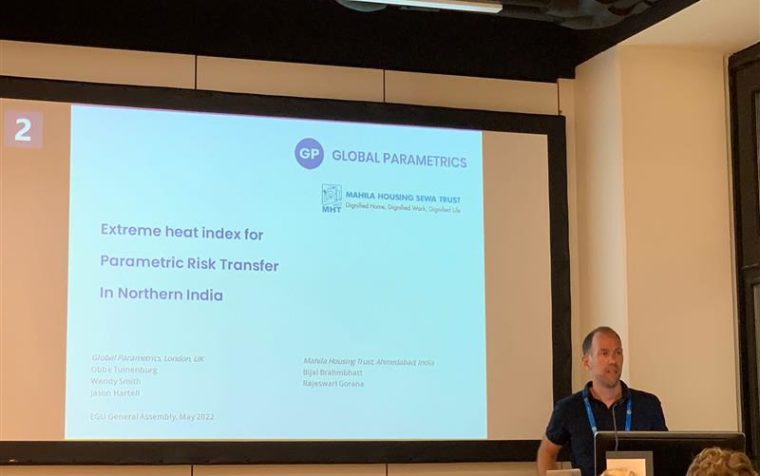
- News
- May 27, 2022
Global Parametrics at the EGU22
This week, our senior scientist Obbe Tuinenburg presented at the European Geosciences Union (EGU) 2022 Annual Conference, held this year in Vienna.
Obbe showcased our recent work developing a parametric solution for urban excess heat, and the role it can play in adaptation for climate vulnerable regions.
Obbe outlined a case study for our implementation of the urban excess heat product in Ahmedabad, Northern India, with the women’s network, the Mahila Housing Trust.
Watch the full presentation below:
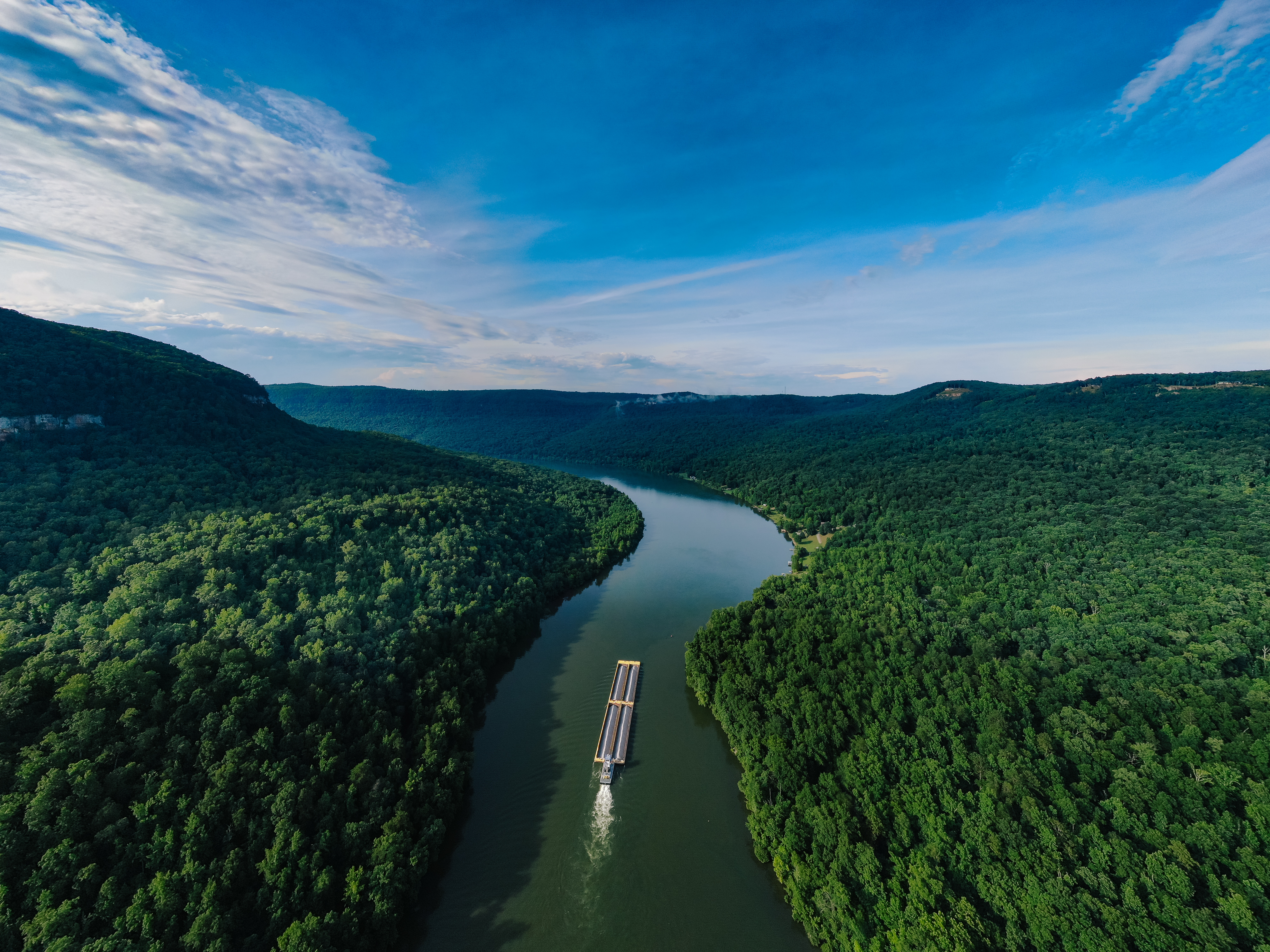
- News
- May 17, 2022
Release of the First Edition: GP Quarterly Impact Briefer
Global Parametrics’ mission is to catalyse markets for disaster risk protection and foster impact at scale.
Through our NDF Partnership, a blend of public and private capital, we combat extreme weather and natural hazard risk.
We are proud to document our journey to reach this impact, with the release of the first edition of the GP Quarterly Impact Briefer.
In this edition, we explore updates from Q1 2022, including:
- The release of the 2021 impact figures
- Announcing the B-Ready website, and our feature in the InsuResilience Global Partnership Annual Report
- Welcoming two new hires, Juan Pablo Sainz and Isabelle De Viggiani, to the GP team.
See below for the full report
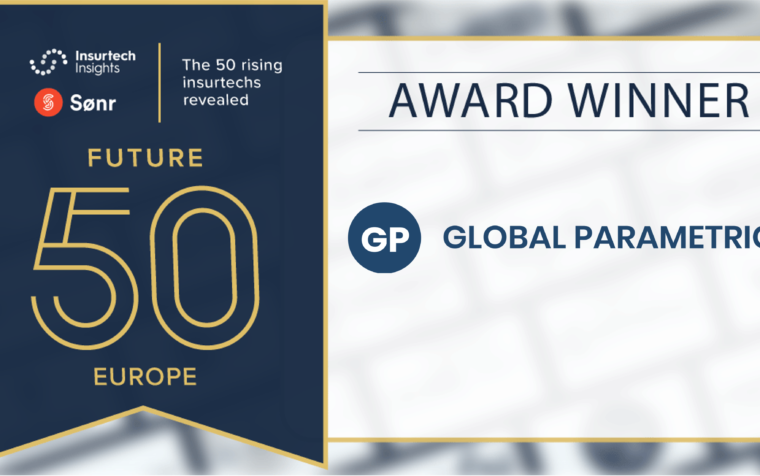
- News
- September 27, 2021
Number 1! Global Parametrics tops Future 50 as one of the most innovative and exciting Insurtechs
Global Parametrics has been ranked no. 1 in Insurtech Insights’ and Sønr’s Future50 Europe- the industry’s definitive ranking of early-stage insurtech startups shaping the risk transfer landscape in Europe.
This award is the result of months of research, with input and critical analysis from some of the most experienced and influential names in the industry. Global Parametrics was selected amongst thousands of contenders for the top spot.
Produced by Insurtech Insights and Sønr Global, a leading market intelligence platform for the insurance sector, thousands of organisations were whittled down to a shortlist of over 300 before the final Future50 were selected by a panel of over 20 C-level judges. Judges hailed from some of the most highly regarded insurance companies worldwide.
Insurtech Insights bases their rating system on The Sønr Index which evaluates millions of data points across the following criteria:
- People: The key people across the business, taking in factors such as where they have studied, their past involvement with startups or notable companies, their known network, and whether they are considered experts in their field.
- Product: Including the core tech stack of the business, patents they have registered, the customer problem they have overcome and any exceptional tech or experience they have created.
- Performance: Growth metrics such as downloads, partnership, investments and traction. And other attributes including financials, market sizing and performance traction to date.
We are honoured for this recognition, which validates both our work and our mandate in delivering solutions to mitigate risk to climate and extreme weather.
See us featured in the full Future50 here:
https://www.insurtechinsights.com/future50-europe/?utm_source=Future50s

- News
- September 24, 2021
Global Parametrics partners with Wharton Risk Center to explore parametric solutions for vulnerable households in New York City
While GP’s efforts to close the disaster protection gap have largely focused where the need is most profound in low- and middle-income economies, vast opportunities also exist to bring some of our lessons learned to vulnerable communities in higher income countries. This is precisely our motivation for supporting the Wharton Risk Center and the New York City Mayor’s Office of Climate Resilience alongside Guy Carpenter in the project: Promoting the Post-Flood Financial Resiliency of Low and Moderate Income Households.
The project recently received Civic Innovation Challenge award from National Science Foundation (NSF)/ U.S. Department of Homeland Security. The objective is to increase the financial resilience of low and moderate-income households in New York City to escalating flood risk through the use of inclusive insurance and innovative parametric solutions.
Pioneering Innovation
GP has been a pioneer integrating parametric solutions into the financial sector in low- and middle-income countries. In our flagship transaction with VisionFund International, we designed a disaster risk financing programme that blends the use of contingent credit and parametric risk transfer. This solution aims to help VisionFund’s microfinance institutions (MFIs) stabilize their balance sheets and access emergency liquidity after a disaster in order to help their borrowers recover more quickly. When disasters hit, lenders typically pull back liquidity, which makes recovery more challenging for the communities they serve. In contrast, the VisionFund initiative promotes quick, countercyclical financing to MFIs and their borrowers to speed up recovery. Now in its fourth year of operations, this programme includes tailored solutions for four different perils and for MFIs in 28 countries across Africa, Asia, and Latin America.
More recently, GP launched the Climate Resilience Enhanced Debt (CRED) product alongside Enabling Qapital, which embeds emergency liquidity and balance sheet support into a traditional wholesale loan product for MFIs. The first CRED transaction provides flood and drought protection to Chamroeun’s portfolio of agriculture loans in Cambodia.
As part of this new effort in New York City, GP will be helping to explore ways to work with local Community Development Financial Institutions (CDFIs) to incorporate similar parametric solutions as those deployed alongside VisionFund and Enabling Qapital. CDFIs represent a key lifeline to low and moderate-income households and finding ways to help these institutions promote faster recovery within the communities they serve can go a long towards building resilience and closing the disaster protection gap.
Read more about the programme here: https://riskcenter.wharton.upenn.edu/civicinnovations/
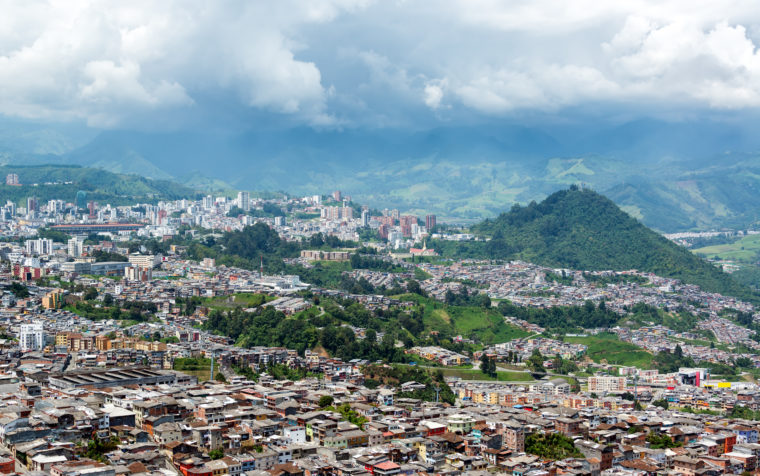
- News
- September 22, 2021
Launch of NDF Technical Assistance Facility to enable landslide offering in Colombia
Global Parametrics (GP) and Germany’s KfW, one of the world’s leading promotional banks, today announced the first use of the NDF Technical Assistance Facility, a € 3 million grant from the German Federal Ministry for Economic Cooperation and Development (BMZ) designed to facilitate high impact and scalable risk transfer with capacity from the Natural Disaster Fund (NDF) and partners.
The Technical Assistance Facility (TAF) will act as a complement to the NDF – with the objective to mitigate start-up challenges which often occur when designing parametric risk transfer solutions for clients with developmental impact, including the high investment costs of product development, institutional education and distribution in fledging markets. The TAF will also provide funding for research and development activities to create an innovative product offering where market demand has been identified.
Through initial catalytic investment from the TAF, solutions will grow and scale, serving to deepen the risk transfer market in developing and emerging economies. This will contribute to the NDF’s target of indirect protection to between 66 – 105 million poor and vulnerable people under the InsuResilience Global Partnership by 2025.
The first programme to harness the TAF, in partnership with risk modelers ERN and Ingeniar Ltd, will create an offering for landslide risk in the city of Manizales, Colombia. The funding will build a unique rainfall-based landslide model, harnessing rainfall data within Manizales’ network, including historical records and statistics from local stations. Global Parametrics will structure a parametric risk transfer product based on the final index. The risk transfer capacity for this solution is anticipated to come from the NDF and international reinsurance and capital markets.
The parametric programme will provide another layer of protection alongside pre-existing indemnity policies to assist in immediate recovery efforts in the aftermath of a landslide event in Manizales. This disaster management mechanism is anticipated to cover over 260,000 residents in the city. It is envisioned that the product will be able to scale up into a wider offering, to catalyse future market activity for similar solutions in other geographies.
Stefan W. Hirche, Principal Portfolio Manager of KfW, said “With our support of the Natural Disaster Fund, the German government and we at KfW are proud to enable our partner countries to protect their citizens better against climate risks.”
Hector Ibarra, CEO of Global Parametrics stated, “The Technical Assistance Facility is a key instrument to promote innovation in resilience to natural hazards and extreme weather. We are pleased to partner with ERN and Ingeniar to develop this vital protection against landslide risk.”
Mario Ordaz, President of the Board of ERN stated, “The development of a parametric landslide product for Manizales, the first of its kind in Colombia and Latin America, will improve the disaster financing planning at city level, allowing coverage for a recurrent peril.”
Alexa Morales, Director of the Disaster Risk Management Unit of Manizales acknowledged, “We want to consolidate an effective risk reduction and adaptation strategy to allow us anticipate disasters using territorial planning and financial protection strategies, besides responding to them efficiently with the aim of making the city more sustainable, resilient and competitive.”
Omar D. Cardona, CEO of Ingeniar Ltd. said, “Having detailed inventories of landslides by the City and Corpocaldas, besides records of previous rains for each case, together with a real-time warning system and hazard models developed by the National University of Colombia, makes Manizales an ideal natural laboratory.”
About Global Parametrics
Rethinking risk to build more inclusive resilience: Extreme weather events and natural hazards are being intensified by climate change, increasing the frequency and intensity of economic shocks which disrupt business and threaten livelihoods.
Established in 2016, Global Parametrics is a specialty provider of parametric solutions for natural hazard and extreme weather risk in emerging economies. Working with the private, public and third sector, GP uses its innovative climatic, seismic and financial risk modelling to rethink resilience for a new era of risk.
Learn more at: https://globalparametrics.com/
About ERN
ERN is the Latin American leader in catastrophe risk models, evaluating natural and man-made hazard that impact people, buildings and infrastructure. ERN strives to provide solutions to the needs of our clients by extending our knowledge through studies and projects in different regions of the world. ERN’s avant-garde products and services are the results of an experienced team that is always committed to offering state-of-the-art methodologies and tools because of the continuous interest in research, development and technology.
Learn more at: https://www.ern.com.mx/web/index_en.html
About Ingeniar Ltd
INGENIAR has been the main private advisor for the local government of Manizales and the Autonomous Environmental Authority (CORPOCALDAS), leading over the past years the development of state-of-the-art risk management instruments, currently operational in the city. INGENIAR has led the development of the catastrophe risk profiles and disaster risk indicators of most of the countries of Latin America and the Caribbean for the Inter-American Development Bank, and led the development of the multi-hazard Global Risk Model for the UNDRR Global Assessment Reports.

- News
- September 10, 2021
Launch of the Climate Resilience Enhanced Debt (CRED) Product
Global Parametrics (GP), provider of parametric protection solutions against natural hazard and extreme weather risks in emerging markets, and Enabling Qapital, an impact investor and advisor of the Enabling Microfinance Fund (EMF), today announce the joint development of the Climate Resilience Enhanced Debt (CRED) product. The innovative offering enables microfinance institutions to access critical emergency financing after a climate event to help promote business continuity and increase resilience within the communities they serve.
The first CRED transaction was recently signed with Chamroeun, a leading microfinance institution in Cambodia. The instrument targets Chamroeun’s agricultural lending portfolio of approximately 5,000 smallholders with protection against severe drought and flooding. The financing solution has a three-year term.
When disasters hit, lenders typically pull back liquidity, which makes recovery more challenging for the communities they serve. In contrast, the CRED product offers quick, countercyclical financing to businesses to speed up recovery.
The CRED product utilizes GP’s parametric index platform to tailor efficient structures to the climate risks of Enabling Qapital’s clients. The Enabling Microfinance Fund then provides contingent financing on pre-agreed terms that is triggered based on GP’s climate indexes. The contingent financing offers Chamrouen fresh cash post-disaster to help their borrowers continue operating in the face of such adverse conditions, which ultimately leads to more resilient communities in Cambodia.
To manage any downside risk of its CRED loans, the Enabling Microfinance Fund also purchases matching risk transfer protection from the Natural Disaster Fund (NDF) which is managed by the GP team. Thus, when a contingent loan is triggered for the more extreme events, EMF receives a payment from the NDF and transfers the majority to Chamroeun in the form of interest rate reduction or principal forgiveness. By efficiently packaging this parametric solution as an add-on to a standard loan product, GP and Enabling Qapital have been able to significantly reduce the cost of protecting vulnerable communities against climate risks.
The Enabling Microfinance Fund is currently USD 276 million in assets, with investments in loans to microfinance institutions across Asia, Africa and Latin America, and thus offers an ideal platform to replicate this offering in other markets. As many communities in low- and middle-income countries grow increasingly vulnerable to climate risk, the CRED product can offer a much-needed solution for efficient and affordable risk management for lenders to the working poor.
Vice President of Global Parametrics, Dan Bierenbaum remarked: “We’re thrilled to partner with Enabling Qapital on this innovative solution. With growing vulnerability to climate risks in emerging economies, we see the CRED product as an ideal way to get targeted financing into these communities post-disaster. Leveraging credit instruments provides a particular cost efficient means to deliver the emergency funding, which helps to make this protection more affordable for the communities that need it most.”
Chuck Olson, Managing Partner at Enabling Qapital commented: “We have closely followed the pioneering work at Global Parametrics in mitigating climate risk, and are extremely proud to be working with them on the launch of our climate initiative. We believe we have found the ideal partner in Chamroeun, as their experienced team is already pushing boundaries in access to finance in Cambodia.”
Yannick Milev, CEO of Chamroeun noted “Having a strategic partner to help us respond proactively with adapted services to our agri-business clients’ challenges, while at the same time protecting our assets, is an important development for Chamroeun. Chamroeun’s ambition is to further expand its services to vulnerable families in rural areas, and this has been made all the more necessary by the current global Covid-19 pandemic. Indeed, building resilient and competitive economies in the agricultural sector is an important strategy for all stakeholders in Cambodia, but brings with it important risks associated to increasingly uncertain weather patterns. Chamroeun’s partners (clients) are the ones most vulnerable to these, and it is important we come together as a global community in initiatives such as this one, for us to all share the burden of that risk more equally.”
About Global Parametrics
Rethinking Risk to build more Inclusive Resilience: Extreme weather events and natural hazards are being intensified by climate change, increasing the frequency and intensity of economic shocks which disrupt business and threaten livelihoods.
Established in 2016, Global Parametrics is a specialty provider of parametric solutions for natural hazard and extreme weather risk in emerging economies. Working with the private, public and third sector, GP uses its innovative climatic, seismic and financial risk modelling to rethink resilience for a new era of risk.
Learn more at: https://globalparametrics.com/
About Enabling Qapital – Moving Money to Meaning
Enabling Qapital Ltd. is an Impact Investment Advisory Company with strong ties in the impact investment sector, deep expertise in finance, and a proven investment management track record. Enabling Qapital has built an innovative state-of-the-art approach to investing with impact. The Founding partners have combined a unique set of skills and a 100+ year successful track record to become the exclusive advisor to the Enabling Microfinance Fund.
Enabling Qapital has a global footprint with teams based in Switzerland, Liechtenstein, Africa, Central Asia, East/South Asia and Latin America. The key strength of EQ’s business model is its people – combining a local presence in the regions where they work with experienced Investment Officers who originate, execute and monitor impact investments.
Learn more at: https://www.enabling.ch/
About Chamroeun Microfinance Plc.
Chamroeun Microfinance Plc. is a licensed microfinance institution based in Cambodia, currently supporting 45,000+ partners (clients) in 16 of Cambodia’s 25 provinces. Chamroeun is a client-certified institution and aims to be the leading social microfinance institution in Cambodia. With 21 branches and a portfolio exceeding 30 million USD, Chamroeun has developed a range of innovative solutions to promote inclusive and responsible lending. Chamroeun’s portfolio is currently in rural areas at 60%, and in support to agricultural businesses at 30%. It provides both end-user and corporate financing in the agricultural sector, with exposure to a range of commodities and value-chain actors, including rice, aquaculture, poultry, cassava, and others. Chamroeun’s offer of loan services is mostly uncollateralized, and it supports its partners with financial literacy and business development services.
Learn more at: https://www.chamroeun.com/
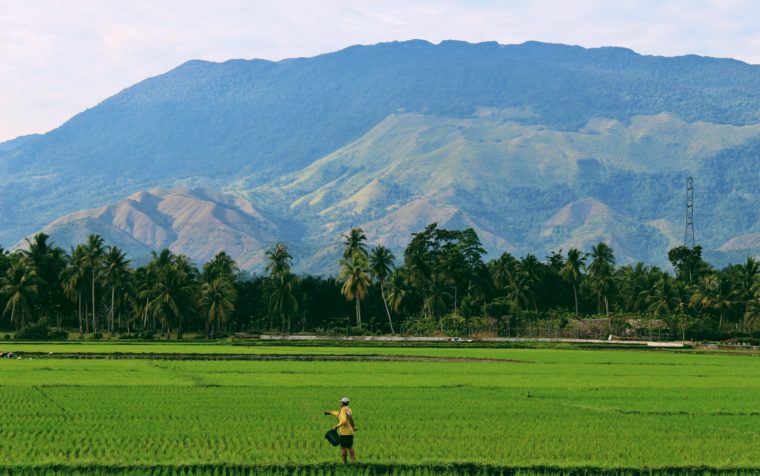
- News
- July 1, 2021
Unlocking protection for rural smallholders in emerging economies
Washington, DC and London, United Kingdom – The Demex Group, creators of a first-of-its-kind platform for analyzing, pricing, and transferring climate-linked risks at scale and Global Parametrics, provider of parametric solutions for natural hazard and extreme weather risk in emerging economies, today announced 2 new programmes enabling financial protection for those traditionally underserved by formal risk transfer. The collaboration harnesses Demex’ core technology to develop protection for smallholders in both the Philippines and Vietnam, in order to combat climate risks and enhance community resilience.
In the Philippines, within a consortium led by Global Parametrics and including CLIMBS, IBISA Network and the International Centre for Tropical Agriculture (CIAT), the initiative is developing a novel new protection for agricultural cooperatives.
The overall objective of the product offering is to help cooperatives finance agricultural entrepreneurs against hydrometeorological risks, in order to build resilient and sustainable communities. The consortium provides a meso-level solution; for the initial transaction, the product will be offered to four savings and credit cooperatives and one agricultural cooperative affiliate, with the aim to rapidly scale for coming seasons.
Coffee production provides a livelihood for 2.6 million people in Vietnam, including over 600,000 smallholder farmers. Climate change threatens to become an environmental disaster for farmers due to decreased water availability, pest and disease attacks and more frequent extreme weather events. Global Parametrics deployed the Demex Solutions Center to structure a parametric extreme rainfall protection for ECOM coffee group in the Central Highlands of Vietnam. This programme is the first of its kind whereby a global trading entity is supporting its smallholder producers with a non-subsidised climate resilience product, acting as a benchmark for future programs.
Global Parametrics and Demex are improving coverage for the most remote locations with unparalleled quick, efficient, and comprehensive coverage across a range of perils including excess wind, drought, flood, and tropical cyclone.
Alin Radu, Head of Product and Structuring for Global Parametrics said, “Demex enables us to rapidly price and settle high volumes of transactions. This gives us the capability to easily replicate, scale and enhances our ability to operate anywhere in the world.”
Steve Bennett, Head of Product for Demex said, “We’re excited to work with Global Parametrics to create secure and scalable solutions that are specifically designed for hyper-local climate safeguards.”
Hector Ibarra, Chief Executive Officer for Global Parametrics said, “We are delighted to partner with Demex who have not only furthered our offering but also boosted our ability to provide innovative climate protection and resilience solutions to the underserved. We look forward to continue to work together in supporting this commitment.”
Ed Byrns, Chief Executive Officer for Demex said, “Global Parametrics’ focus on traditionally underserved communities is an important part of the ecosystem for climate resilience. This initiative is an important step toward our Demex mission to make it simple for businesses to financially protect themselves from climate-linked operational risk at a global scale.”
About The Demex Group
Demex technology is a first-of-its-kind platform for analyzing, pricing, and transferring climate-linked risks at scale. With increasingly variable weather conditions, Demex offers businesses the ability to manage risk and create opportunity.
Demex enables businesses to identify and implement climate risk transfer solutions by seamlessly integrating the weather data, cashflow modeling and channel partners required to provide coverage that’s tailored for each customer.
Demex shields customers from the financial surprises of volatile weather so that they can grow their businesses. Learn more at www.thedemexgroup.com
About Global Parametrics
Rethinking risk to build more inclusive resilience: Extreme weather events and natural hazards are being intensified by climate change, increasing the frequency and intensity of economic shocks which disrupt business and threaten livelihoods.
Established in 2016, Global Parametrics is a specialty provider of parametric solutions for natural hazard and extreme weather risk in emerging economies. Working with the private, public and third sector, GP uses its innovative climatic, seismic and financial risk modelling to rethink resilience for a new era of risk. Learn more at: https://globalparametrics.com/

- News
- May 7, 2021
Insuring Nature: How UK’s finance is safeguarding Mexico’s coral reefs
Our Partnerships and Business Development Lead, Juan Marcano, writes for Global Parametrics as part of the UK Department for International Trade‘s Business of Resilience thought leadership series. The Business of Resilience Campaign is promoting the UK’s capabilities in resilience insurance and associated services covering climate and natural disasters, pandemics, cyber and other related supply chain risks.
Climate change is increasing natural hazards and extreme weather risks globally. But as these risks grow, so have the number of innovations to mitigate them. Insurance – often seen as the dull side of finance – now has a key role in providing solutions to the climate crisis.
Currently, many businesses and individuals lack formal risk transfer in areas which suffer from natural hazard and extreme weather risk. This protection gap poses a challenge, but also an opportunity for re/-insurance players to strengthen global economic resilience and to grow into these emerging markets. Harnessing innovations in technology and risk management has only increased the ability to develop such solutions and cover previously uninsurable risk.
The experience in Mexico
The Mexico Reef Protection Programme (MRPP), launched in 2018, was seen as a first step in changing how we value our natural assets, and the place of the insurance sector in protecting and restoring natural landscapes.
The programme protects a large section of the Mesoamerican reef, releasing payouts in the event of a tropical storm to be used for restoration of the reef itself.
Providing cover for the reef not only protects the reef, but has knock-on positive effects to the communities on its shore. Coral reefs act like natural sea walls; shielding nearby buildings from the devastating impacts of tropical storm surge. Preserving the reef also retains the ecosystem (beaches, dunes, marine environment) which are essential for tourism income in the area. The programme is a prominent example of a nature-based solution; conserving and protecting nature to the benefit of society and human well-being.
The Reef Programme is a parametric solution; providing a pre-agreed payment based on the probability of the pre-identified event. These methods of coverage take away the need for valuing the asset itself, meaning the policy is triggered not by financial losses, but when a pre-identified event occurs, which in this case is when wind speeds exceed 100 knots in a pre-defined area.
Parametric solutions provide an ordered and managed method to inject funds from global reinsurance and capital markets into areas impacted by natural catastrophe risk. This market solution relies on private capital to finance a gap which would otherwise be shouldered by local government and communities.
How it all works
For the MRPP, funds are paid out following a parametric trigger for a tropical storm in an area of the Mesoamerican reef. Leveraging parametrics for the programme ensures a rapid and objective payout, and transparency on payment conditions. Through the latest technology in scientific risk hazard modelling, the risk of tropical storm in the area can be more easily understood, allowing local government and affected communities to consider further pre-disaster risk assessment management and response planning.
Integrating the understanding of risk on the ground as perceived by the end user creates a better placed product. By engaging with the local government of Quintana Roo, the MRPP helps to achieve the sustainability of the programme in future, promoting knowledge sharing of the technology and infrastructure behind the programme and the creation of an inclusive and transparent system for premium collection.
Innovative programs such as the MRPP, are often initiated and subsidized via donor agencies or corporate social responsibility initiatives, which, although useful for establishing a programme’s infrastructure and mechanisms, are not focused on sustainable methods to continue and expand once the duration of the programme is complete.
By engaging the local financial sector, the state of Quintana Roo was able to renew this programme without subsidies, even during the Covid-19 Crisis. The renewal was conducted through Mexican insurer Banorte, supported by Global Parametrics and the Natural Disaster Fund – a public private partnership designated to mitigate the challenges in natural disaster resilience for low-and middle-income countries with participation from the UK and German governments and global reinsurer Hannover Re. The local commitment and brings understanding of such a programme and its associated products to the local market, thereby increasing capacity at the local level for future renewals and scale.
The local benefits
Following Hurricane Delta on 7th October 2020, the reinsurance policy paid out 40% of the total limit within 14 days. The final payment was used to fund work dedicated to the restoration of the reef. Given these successes, the local government of Quintana Roo is looking to expand the scope of the programme to include beaches and dunes, and to scale up the geographic coverage.
As the risk of extreme weather and natural hazards grow, so does the opportunity for firms to take part in risk management solutions. Nature based solutions are an important tool to manage the effects of climate change. Risk transfer can both protect the natural and human element of these programmes and mitigate the financial impact of natural events. Linking the two creates sustainable interventions that build local resilience and capacity to help mitigate the impact of extreme weather events.
To learn more about the insurance industry and the positive impact it has in climate resilience join the Business of Resilience Conference 2021
- News
- April 21, 2021
2020 Global Parametrics/NDF Impact Report Released
Global Parametrics’ mission is to catalyse markets for disaster risk protection and foster impact at scale.
Through our NDF Partnership, a blend of public and private capital, we combat extreme weather and natural hazard risk.
Our 2020 Impact Report shows the key figures from our first year of partnership.
Some highlights:
- Over 5+ million beneficiaries provided with risk protection;
- Protection across 20 low- and middle-income countries;
- Coverage for 6 perils, including: earthquake, flood, tropical cyclone, excess rain, drought and excess wind.
In 2021 we hope to build on these successes, grow and scale up operations in existing areas and push to new markets.
See below for the full report
